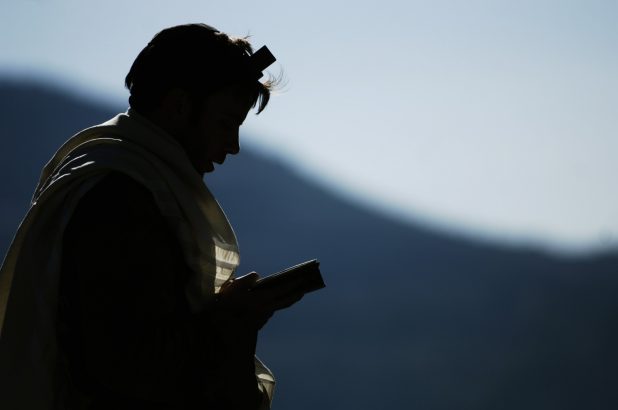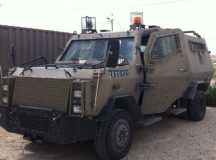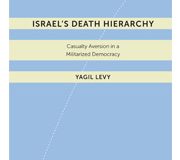A fast-changing society, a disturbing new regional security environment and radical new ideas in military philosophy: are we witnessing the rise of the IDF 2.0?
The IDF & Social Change
Alan Johnson: The IDF has to adapt to a changing Israeli society, a changing regional security environment, and radical new ideas in military philosophy. I’d like to talk about how successfully it is adapting and whether we can begin to see the outlines of an ‘IDF 2.0’. Let’s start with the IDF’s relationship to a rapidly changing Israeli society. You wrote in Haaretz that, ‘The IDF is being used as a battlefield for the cultural and political wars of outside forces.’ I’d like you to talk about the ‘battle.’ What’s it about? Who are the protagonists? Who is winning? What is at stake?
Amos Harel: The IDF has a very important place in Israeli society. That has to do with its history, with an environment in which there is some kind of security challenge every few years, and because Israelis are concerned more than anything else with the security of their families. This is what decides elections in Israel, unlike other places. On the other hand, both the society and the army have been going through huge cultural changes.
Which parts of the population are most involved in the army; who is occupying the important positions, serving in the combat units, and going on to become officers and have a military career – all of this is changing. If you look back at the IDF of the 1950’s and 1960’s, it was led by sons of the Kibbutzim and the Moshavim, often part of the Labour movement, most of them Ashkenazi, with European parents. This has changed. I’ll give you one statistic which is amazing and relates to religion.
Last year in the infantry officer course, 42 percent of the cadets were religious. These future officers – Zionist, religious – sympathise with the right-wing in most cases, and are more observant. Religious discipline is far higher than it was 10 or 20 years ago. In the same officer’s course in the 1990s just two percent of the recruits were religious. So it’s a huge change.
On one hand, this change may make a decision to evacuate settlements in the future much harder for any Israeli Prime Minister, let alone Netanyahu, who with his background in Likud has supported the settlements. What Sharon did in 2005, using the army to evacuate 10,000 settlers from Gush Katif in the Gaza Strip is going to be much more complicated if you have 33 to 40 percent of junior officers coming from that religious background. Who are they going to listen to, the Prime Minister and the officers or the Rabbis? On the other hand, last year nine of these cadets were thrown off the course. There was a ceremony in which women soldiers were singing and these religious officers said that they were too pious to listen. So they were thrown off.
So the IDF becomes a cultural battleground. You have the old mainstream forces in Israeli society who no longer hold the same grip they once had on the IDF, though they still seek to maintain the old IDF values. And you have new and vocal parts of society that are much more motivated to send their own children into the IDF. Statistics are important. Religious Zionists are about 12 to 15 percent of the population, about 20 to 25 percent of soldiers in combat units, but maybe 30 to 40 percent of the junior officers in combat units. From that we see that their motivation is high. They feel they have to defend the country, but it’s also a result of being part of that ideological camp. I think most Israelis are not fully aware of this. The IDF has been going through a lot of changes as a result.
AJ: The IDF has helped assimilate hundreds of thousands of new immigrants and youth from development towns. Now Israel’s social balance is changing again. There are more Russians, more Haredim, and more Arabs. At the same time the centrist majority is calling for more integration into the IDF, especially of the Haredim.
As you look ahead 10 or 20 years, what will determine whether the IDF can cope with these changes and continue to play its ‘melting-pot’ role? Can it do the same for the Haredim? Knesset Member Yohanan Plesner was put in charge of finding an alternative to the Tal Law to govern the conscription of Haredi men. He said the goal should be that one-third enter the IDF, one-third do other national service and one-third enter the yeshiva. Do you think that is realistic? Would the Haredim put the word of their Rabbi before their commander? And might the entry of the Haredim into the IDF act as a conduit for the divisions of Israeli society to erode the unity of the IDF rather than the IDF dissolving those divisions?
AHl: The divisions aren’t that bad, yet. But I am not sure it is a melting pot anymore. Maybe it is multicultural. We could compare it to what is going on in London in certain aspects. Forces outside the army are interested in the battle. The generals are seeking to halt some of the trends they think have gone too far. The scandal concerning refusal to listen to women singing in IDF ceremonies was a very good example of that. There are cultural changes inside the army and you have to work with some of them, of course. For instance, it used to be that a unit on vacation had what was called an ‘educational week’ which was mostly hanging around the pool and so on. Religious soldiers don’t do that. And you need to find other solutions for them and that is fine. The problem is how far are you going to take this and to what degree outside forces can influence this.
The IDF is still in many ways the rite of passage in Israeli society. Ethiopian Jews, for example, go to combat units much more than any other part of society. Not all of them cope, many of them have a lot of financial and family problems at home and they can’t remain in combat units for three years. But some do, and this is their gateway into society.
Once they are paratroopers they expect to be treated differently, and to a certain extent they are. The IDF still plays that role. If you put together two average Israeli males in their forties who haven’t met before, the second or third thing they’ll ask each other is ‘where did you serve in the army, what did you do?’ And immediately it will be a case of ‘oh, my brother was in the same unit’ or ‘my cousin was your commander.’ We still judge each other by that.
Now that is changing. When the new commanders are 30 percent or 40 percent religious it means that the secular are not sending their sons to the same positions, at least not at the same rate. It used to be embarrassing, 30 or 40 years ago, for somebody not to go and become a paratroop officer, even if it wasn’t his character or his nature. Now it’s fine with mainstream Israel to go to a cyber or an intelligence unit instead. Well, it’s not so fine in the settlements, and over time this also brings change. Despite all this, I still feel that the IDF represents most of the major branches of Israeli society; probably better than media or business. It’s still a gateway into society.
AJ: One of the greatest challenges the IDF is going to face is what to do about the expiry of the Tal Law, which allows Haredim to avoid military service, following the Supreme Court ruling that the law was unconstitutional. What form could the integration of the Haredim into the IDF take? And if the efforts to do so fail, what will the consequences be?
AH: It’s not going to happen on a mass scale or overnight. And I’m not sure the IDF needs holy brigades of pious, religious, ultra-orthodox soldiers! Look, involvement is already a growing phenomenon. Each year we have several hundred Israelis from Haredi backgrounds joining combat units. And we have older Haredim, usually 22 to 25, who have enlisted in the army for a professional job. They work with computers, deal with logistics and so on. And they see this as a way out from being trapped in the Yeshiva world. According to the old law you can either be in the army or the yeshiva. But you have to be in the army to get to the real world, to earn money like everybody else.
Some Haredi rabbis understand now that things must change, not only because of the Supreme Court ruling but also because of the impact of the status quo on both Haredi society and Israel. What the IDF is suggesting, and it seems like a good idea, is to let the army pick and choose. There are 7 to 8 thousand Haredim who are 18 years old. The IDF is saying, ‘let us pick one third who fit our standards and who we actually need, and put some of them in combat. Let others operate computers and stuff like that. Another group can go to what we call national or civil service in the communities. And some will remain in the Yeshiva. It won’t be that tiny number of 400 that Ben-Gurion agreed to [exempt from IDF service in order to study Torah] in the 1950’s. But it won’t be six or seven thousand a year like it is today. That is something Israeli society just can’t live with anymore.
Hopefully they’ll find some kind of solution along these lines. But it’s going to be very tough to achieve because Haredi politicians have been very efficient at preventing exactly that kind of solution for many years. And we’ll see how much political power Netanyahu has over this. I suspect we’ll end up with more Haredim serving, more of them going to civil service and national service, but we won’t have a full solution in which my kids and the kids from the Haredi town of Bnei Brak serve in the same units and take the same kind of risks to defend Israel.
AJ: Is the IDF becoming an army of settlers?
AH: There is a change and it is a matter of concern. But no, it’s not an army of settlers. Right now, the grip of the institution of the IDF and of its core values is still very strong. Yes, there is a shift and it might be troubling if the generals don’t take a stand. In that case we might see problems in the future with the possible evacuation of settlements. But it’s not that the army is receiving orders from the settlers. The relationship between the army and the settlers in the West Bank, is sometimes very troubling for Israeli democracy, for Israeli law and order, and so on, but it’s not got near to a situation in which the settlers are giving the orders. It’s the same army who evacuated those settlers from Gush Katif in the Gaza Strip and what people would tell you is that they went through this trial, which was very difficult, and they were tested and stood firm. They obeyed orders mostly.
Sometimes the commanders were smart enough to send them on other missions. I think it’s going to be much more complicated when you speak about the West Bank, about Judea and Samaria, because of the biblical background. The Gaza Strip was different because the majority of Israeli people supported the withdrawal. Sharon became in his last years – and this was sort of amazing – a sort of a father figure. Most Israelis felt he was right whatever he did. He decided to reoccupy the West Bank in Operation Defensive Shield in 2002; he was right. He decided to build a barrier against his own instincts; he was right. He decided to evacuate the Gaza Strip. With somebody else making such decisions about the West Bank, with all its meaning for the Jewish people, it will be much more complicated.
AJ: At the end of the Oslo period and the start of the Second Intifada, a new philosophy emerged in the IDF, associated with Brig. Gen. (res.) Shimon Neveh, head of the IDF’s Operational Theory Research Unit (OTRI). Oddly, it was influenced by postmodern French philosophy, especially the writings of Deleuze and Guattari, but also Lyotard and Virilio. A battery of concepts emerged, all aimed at theorising war-fighting in complex environments – ‘swarming,’ ‘rhizomatic warfare,’ ‘non-linearity’ and ‘walking through walls.’ This new philosophy was perceived as having been partly to blame for the failures of the Second Lebanon War. A paper published by the Begin-Sadat Center for Strategic Studies argued that the IDF became ‘captive to a problematic operational approach and a language that was unfamiliar to most of the forces in the field.’
Can we talk about this episode? Did the new philosophy offer important insights that the IDF will have to take on board in the future when considering how it deploys force?
AH: First, I think this is greatly exaggerated. The strategic outcome of the Second Lebanon War was not necessarily that bad. We see that six years later Hezbollah is still deterred. I think the IDF should have done much better, yes; but its leadership was to blame for the result. We shouldn’t have been satisfied with the draw. We should have won. Once we decided to enter the conflict, which wasn’t the smartest decision in the circumstances, we should have performed better. But to blame it on theory… it’s not the issue. Avi Issacharoff and I wrote in our book that most of the fault was with the leadership and their decision making and the fact that the IDF didn’t practice enough. I don’t think that these guys, who I don’t necessarily agree with, like Shimon Naveh for instance, should be blamed for the IDF’s problems in Lebanon. It’s more to do with the Chief of Staff and the way the northern command performed, not because one guy talked of ‘swarming,’ and another talked of ‘low intensity conflicts.’ There is a case to be made that the IDF concentrated on fighting terrorists and arresting them in Nablus, and didn’t practice for dealing with tanks against the Hezbollah guerrillas or with anti-tank rockets while crossing the Saluki river in Lebanon. They should have prepared for that scenario also. That they did not do so was not because they were so busy studying French philosophers but because they didn’t have time to practice. And they didn’t have time to practice because they were busy hunting down suicide bombers all the way from Nablus to Tel-Aviv.
Second, what happened after the war was that an atmosphere of anti-intellectualism set in, especially under Chief of Staff Gabi Ashkenazi. Sometimes, that went too far. Of course, what Shimon Neveh and his associates were proposing should not have been accepted like a Torah from Sinai! I think that some of their ideas were complicated, and, unsurprisingly, the generals simplified those ideas in an unconstructive fashion. Yes, some mistakes were made, but the counter-revolution after the Lebanon war was also dangerous for the IDF. I think now it’s become safe again to actually think in the IDF after a couple of years, and it’s a pity that didn’t happen earlier.
AJ: Do you think there was something valid in what these theorists were arguing; that conflict is rarely linear these days, there are few straight-line formations of tank regiments, that more often conflict takes place within much more complex environments, and that this demands shifts in war-fighting theory and practice?
AH: And this is why your answer should be modular. You should prepare for many different scenarios. I remember a conference in 2006-2007 when old tank generals spoke emotionally one after the other. It seemed like cavalry generals from before the First World War saying we’ve got to bring back the horse! Yes, you have to move forward and you have to realise that it’s going to be a mix of symmetric, asymmetric, and maybe – God forbid – nuclear and chemical weapons they’ll have to deal with. And you will need much better answers to all of these scenarios. One of the problems with the IDF is they concentrate too much on certain scenarios which they know better and have been successful in tackling. But when they have to, they learn. Looking back at the Second Intifada, it did take them quite a long time to get on top of the terrorism, but in the end they found a way. And that was quite a feat.





































